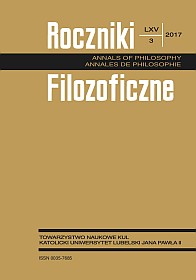Does Aristotle’s Akratēs Not Choose and If Not, Why Not?
Abstract
G.E.M. Anscombe put her finger on an inconsistency in Aristotle’s Nicomachean ethics: Aristotle seems to claim that whatever results from deliberation is the object of choice, and he admits that the akratēs deliberates at times quite successfully, yet he denies that the akratēs makes a choice. She provides a solution: A choice (she thinks Aristotle should have said) is not just whatever results from deliberation but only if the goal at which the deliberation aims was itself chosen, which she interprets as constituting object of the agent’s will (βούλησις [boulēsis]). I examine this Anscombian solution, point out its diverse shortcomings (infinite regress, the inscrutability of the lineage of choices, the unachievability of the primordial goal) and yet I attempt to improve upon it. To this aim I put up for consideration whether such (post-)primordial choices as Anscombe seems to require are not, after all, sometimes made, viz. in the light of one’s idea of living well, and if they are not at least in principle translatable into goals that we can reasonably hope to achieve.
References
Ando, Takatura. Aristotle’s theory of practical cognition. The Hague: Martinus Nijhoff, 3rev.1971.
Angier, Tom. „Happiness: overcoming the skill model”. International Philosophical Quarterly 55 (2015), 1: 5–23.
Anscombe, G.E.M. „Thought and action in Aristotle: What is ‘practical truth’?”. W: New essays on Plato and Aristotle. Red. John R. Bambrough, 143–158. London: Routledge and Kegan Paul, 1965.
Anscombe, G.E.M. Intention. Cambridge, Mass., London, England: Harvard University Press, 1965.
Anscombe, G.E.M. „Thought and action in Aristotle: What is ‘practical truth’?”. W: The collected papers of G. E. M. Anscombe. T. I: From Parmenides to Wittgenstein, 66–77. Oxford: Basil Blackwell, 1981.
Aristotle. Nicomachean ethics. Book six. Tłum. L.H.G. Greenwood. Cambridge: Cambridge University Press, 1909.
Aristotle. The Nicomachean ethics. Tłum. H. Rackham. M.A. London: Heinemann, 1962.
Aristotle. Nicomachean ethics. Tłum. Roger Crisp. Cambridge: Cambridge University Press, 2000.
Aristoteles. Aristoteles Latinus. T. 26, 1–3, fasc. 4: Ethica Nicomachea. Translatio Roberti Grosseteste sive ‘ Liber Ethicorum’. Red. Renatus Antonius Gauthier. Bruxelles, Leiden: Desclée De Brouwer, E. J. Brill, 1973.
Arystoteles. Etyka eudemejska. Tłum. Witold Wróblewski. W: Dzieła wszystkie. T. V. Warszawa: Wydawnictwo Naukowe PWN, 2000.
Arystoteles. Etyka nikomachejska. Tłum. Daniela Gromska. Warszawa: Państwowe Wydawnictwo Naukowe, 1982.
Arystoteles. O duszy. Tłum. Paweł Siwek. Warszawa: Państwowe Wydawnictwo Naukowe, 21988.
Arystoteles. Retoryka-Poetyka. Tłum. Henryk Podbielski. Warszawa: Państwowe Wydawnictwo Naukowe, 1962.
Cagnoli Fiecconi, Elena. Aristotle’s account of akrasia. M. Phil. thesis, University College London, 2012. http://discovery.ucl.ac.uk/1383795/1/Elena%20Cagnoli%20Fiecconi%20thesis finalsubmission2013.pdf, dostęp 10-02-2017.
Cicero, Marcus Tullius. „Rozmowy Tuskulańskie”. Tłum. Józef Śmigaj. W: Pisma filozoficzne. T. III: Księgi akademickie. Kom. Kazimierz Leśniak, 473–743. Warszawa: Państwowe Wydawnictwo Naukowe, 1961.
Dahl, Norman O. Practical reason, Aristotle, and the weakness of the will. Minneapolis: University of Minnesota Press, 1984.
Defoe, Daniel. Robinson Crusoe. Jego życia losy, doświadczenia i przypadki. Tłum. Franciszek Mirandola. Wolnelektury.pl. Dostęp 10.02.2017. http://wolnelektury.pl/media/book/pdf/robinson-crusoe.pdf
Filek, Jacek. „Podstawowe pytanie etyczne w horyzoncie prawdy, wolności i odpowiedzialności”. Argument: Biannual Philosophical Journal 3 (2013), 1: 161–175.
Garrocho Salcedo, Diego S. „On passion and desire: Confronting an ambiguity in Aristotle’s ethics”. Azafea. Revista de Filosofía 16 (2014): 21–37.
Gauthier, René Antoine, i Jean Yves Jolif. L’éthique à Nicomaque. T. 2: Commentaire. Louvain, Paris: Publications Universitaires, Éditions Béatrice-Nauwelaerts, 1959.
Gogol, Nikołaj Wasiljewicz. „Игроки” [Igroki]. W: Весь Гоголь. Полное собрание сочинений в одной электронной книге [Wesʹ Gogol. Połnoie sobranie soczinienij w odnoj elektronnoj knigie], 698–726. Noginsk: Osteon Press, aegitas, 2017.
Guyer, Paul. „The form and matter of the categorical imperative”. W: Kant’s system of nature and freedom: Selected essays, 146–168. Oxford: Clarendon, 2005.
Irwin, T.H. „Who discovered the will?”. Philosophical Perspectives 6 (1992): 453–473.
Irwin, T.H. „Historical accuracy in Aquinas’s commentary on the Ethics”. W: Aquinas and the Nicomachean Ethics, red. Tobias Hoffmann, Jörn Müller i Matthias Perkams, 13–32. Cambridge: Cambridge University Press, 2013.
Kahn, Charles H. „Discovering the will: From Aristotle to Augustine”. W: The Question of “eclecticism”. Studies in later Greek philosophy. Red. John M. Dillon i A.A. Long, 234–259. Berkeley: University of California Press, 1988.
Kant, Immanuel. Eine Vorlesung Kants über Ethik. Red. Paul Menzer. Berlin: Heise, 1924.
Kant, Immanuel. Krytyka praktycznego rozumu. Tłum. Jerzy Gałecki. Warszawa: Państwowe Wydawnictwo Naukowe, 1984.
Kant, Immanuel. Metafizyka moralności. Tłum. Ewa Nowak. Warszawa: Wydawnictwo Naukowe PWN, 2007.
Kant, Immanuel. „Metafizyka moralności”. W: Immanuel Kant. Dzieła zebrane. T. V. Tłum. Włodzimierz Galewicz, 287–621. Toruń: Wydawnictwo Naukowe Uniwersytetu im. Mikołaja Kopernika, 2011.
Kant, Immanuel. Uzasadnienie metafizyki moralności. Tłum. Mścisław Wartenberg. Warszawa: Państwowe Wydawnictwo Naukowe, 1984.
Kierkegaard, Søren. Albo-albo. T. II. Tłum. Karol Toeplitz. Warszawa: Państwowe Wydawnictwo Naukowe, 1982.
Kjerulf, Stig. Personlig handlekraft. København: Gyldendal, 2009 (e-book).
Koszkało, Martyna. „Rozwój pojęcia woli w pogańskiej filozofii starożytnej”. Roczniki Filozoficzne 63 (2015), 2: 157–186.
Lem, Stanisław. Głos Pana. Warszawa: Agora, 2012 (wydanie elektroniczne epub, konwersja i edycja przez Publio).
Leibniz, Gottfried Wilhelm. Teodycea. O dobroci Boga, wolności człowieka i pochodzeniu zła. Tłum. Małgorzata Frankiewicz. Warszawa: Wydawnictwo Naukowe PWN, 2001.
Miller, Jon. Aristotle’s Nicomachean ethics: A critical guide. Cambridge: Cambridge University Press, 2011.
Natali, Carlo. „The book on wisdom”. W: The Cambridge Companion to Aristotle’s Nicomachean Ethics. Red. Ronald Polansky, 180-203. New York: Cambridge University Press, 2014.
Schopenhauer, Artur. O wolności ludzkiej woli. Tłum. Adam Stögbauer. Wolnelektury.pl. Dostęp 10.02.2017. https://wolnelektury.pl/media/book/pdf/schopenhauer-o-wolnosci-ludzkiej-woli.pdf.
Schroeder, Mark Andrew. Slaves of the passions. Oxford: Oxford University Press, 2007.
Simon, H. A. „Rational choice and the structure of the environment”. Psychological Review 63 (1956), 2: 129–138.
Szutta, Natasza, i Artur Szutta. W poszukiwaniu moralnego charakteru. Lublin: Academicon, 2015.
Theodore of Mopsuestia. The commentaries on the minor epistles of Paul. Tłum. Rowan A. Greer. Atlanta: Society of Biblical Literature, 2010.
Wells, J[ohn] C. Longman Pronunciation Dictionary. Harlow: Longman, 1990.
Wiggins, David. „Deliberation and practical reason”. W: Varieties of practical reasoning. Red. Elijah Millgram, 277–299. Cambridge, MA, London, England: The MIT Press, 2001.
Copyright (c) 2017 Roczniki Filozoficzne

This work is licensed under a Creative Commons Attribution-NonCommercial-NoDerivatives 4.0 International License.





